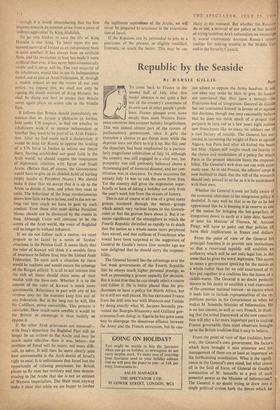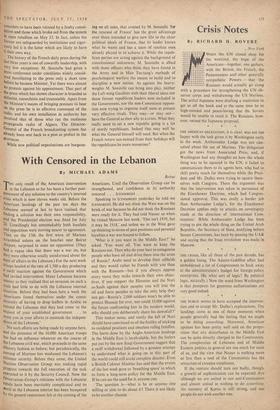Republic by the Seaside
By DARSIE GILLIE Paris To come back to France in the second half of July after five weeks' absence is not quite a fair test of the country's awareness of its own and of other people's prob- lems. France plunges even more deeply than most Western Euro- pean countries into summer holiday forgetfulness. This was indeed almost part of the system of parliamentary government, since it ga4e the executive a chance to get things done while the deputies were not there to trip it up. But this year the departure had been emphasised by a particu- larly magnificent celebration of July 14, although the country was still engaged in a civil war, her prosperity was still perilously balanced above a threatening gulf of financial disaster, and her con- stitution was in abeyance. To these occasions for anxiety July 14 was to add the news from Iraq. Yet the country still gives the impression super- ficially at least of taking a holiday not only from the year's work but from the stream of history.
This is not of course at all true of a great many groups scattered through the nation—groups which attach very various hopes to the Govern- ment or feel the gravest fears about it. But it re- mains significant of the atmosphere in which the Fourth Republic dwindled so rapidly to its death that the nation as a whole seems more perplexed than stirred, and that millions of Frenchmen who would have been surprised at the suggestion of General de Gaulle's return four months ago are now delighted that he should carry the responsi- bility.
The General himself has the advantage over the last weak governments of the Fourth Republic that he enjoys much higher personal prestige, as well as possessing a greater capacity for decision. But it is not true that he can simply select a course and follow it. He is better placed than his pre- decessors to have a policy for North Africa, but he is still not well placed. He has extricated France from the drift into war with Morocco and Tunisia by doing .exactly what M. Jacques Soustelle pre- vented the Bourges-Maunoury and Gaillard gov- ernments from doing; in Algeria he has gone some way to disengage the disastrous alliance between the Army and the French extremists, but he can- not afford to oppose the Army head-on. It will not obey any order he likes to give. Its leaders are convinced that they have a remedy—the Procrustes-bed of integration. General de Gaulle has not committed himself in favour of or against this doctrine, though one may reasonably believe that he does not think much of a project that purports to turn out in a few years eight million new Frenchmen like so many tin soldiers out of a vast factory of moulds. The General has sues ceeded in increasing the weight of Paris as agains Algiers, but Paris had after all kicked the befun last May. Algiers still weighs much too heavily in the choice and modulation of a policy for which';; Paris in the present situation bears the responsi- bility. The General's writ does not run with auto. matic ease.. As in old Prussia, the officers' corps is,, now inclined to think that the will of the monarch should only prevail in so far as it is in accordance with their own.
Whether the General is even yet fully aware of the economic objection to the integration policy is doubtful. It may well be that in so far as he has appreciated this he is keeping it in reserve as one of the means for bringing the hot-gospellers of integration down to earth at a later date. Sooner or later his Minister of Finance, M. Antoine Pinay, will have to point out that policies all have their implications in francs and dollars.
From the point of view of the General his principal function is to provide new institutions, so that a renovated republic will establish an• authority which will be not only legal but, in the sense that he gives the word, legitimate. This seems to mean a government speaking for the nation as a whole rather than for an odd assortment of its bits put together in a coalition like the house of a caddis-worm. The General is no doubt perfectly sincere in his desire to establish a real expression of the common national interest—as sincere when it leads him to include representatives of the re- publican parties in his Government as when he 4.- makes M. Soustelle Minister of Information. He is no less sincere, as well as very French, in think- ing that the actual framework of the new constitu- tion will play a far more important part in making France governable than most observers brought up in the British tradition find it easy to believe.
From the point of view of that tradition, how- ever, the General's own government, the factors which have brought it into existence and his management of them are at least as important as the forthcoming constitution. What is the signifi- cance in the General's own mind, but what above all in the field of force, of General de Gaulle's nomination of M. Soustelle to a post of such potential power as the Minister of Information? The General is no doubt trying to draw into a single political system both the forces which he considers to have been vitiated by a faulty consti- tution and those which broke out from the system in open rebellion on May 13. In fact, unless the former are safeguarded by institutions and vigor- ously led it is the latter which are likely to have it their own way. The history of the French daily press during the last three years is one of cowardly leadership, with very few exceptions. M. Soustelle had given a press conference under conditions widely consid- ered humiliating to the press only a short time before he became Minister. Yet there were almost no protests against his appointment. That part of the press which has shown character is branded as defeatist, masochistic and treasonable. Apart from the Minister's means of bringing pressure to bear on the press he is in effective command of the radio, and his own installation in authority has involved that of those who ran the mutinous Propaganda radio of Algiers. The Director- General of the French broadcasting system has already been sent back to a post as prefect in the Provinces.
While new political organisations are burgeon- ing on all sides, that created by M. Soustelle 'for the renewal of France' has the great advantage over those intended to give new life to the oher political ideals of France, that its leader knows what he wants and has a team of resolute men already played in to achieve it. While the repub- lican parties are acting against the background of constitutional unknowns, M. Soustelle is allied with those officers who think they have found in the Army and in Mao Tse-tung's methods of psychological warfare the means to build and to discipline a new nation. As against the heavy- weights M. Soustelle can bring into play, neither the Left-wing Gaullists with their liberal ideas nor those former republican leaders now included in the Government, nor the non-Communist opposi- tion now trying to organise itself seem at present very effective rivals. They may—or may not— have the General as their ally in a crisis. What they really need to set a new republic going is a lot of sturdy republicans. Indeed that may well be what the General himself will need. But when the French return sun-tanned from their holidays will the republicans be more numerous?



































 Previous page
Previous page